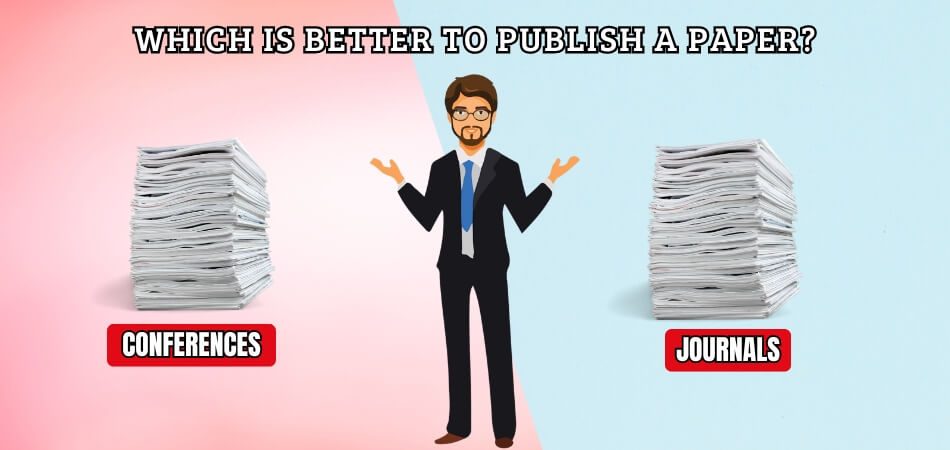The publication of research findings and case studies is an important step in the academic and professional journey of researchers and practitioners alike. This brings us to the pressing question: Is it Better to Publish in Journals or Conferences?
The response largely hinges on your specific goals. Journals have a stellar reputation and rigorous peer review processes, which give them academic credibility.
On the other hand, conferences provide an excellent platform for immediate feedback and extensive networking opportunities, which are major for developing collaborations and making a swift impact.
Continue reading our detailed article to learn more about the advantages and considerations of each option.
Publication of Research Findings- Why is it Important?
Publishing research findings is essential for advancing knowledge, developing innovation, and supporting academic and professional growth. Through sharing results, researchers contribute to a global exchange that refines and reshapes established understandings. This collaborative approach drives critical improvements in various fields and helps guide future discoveries.
Contributing to Collective Knowledge
By publishing research, scientists enhance the shared pool of knowledge that underpins all academic fields. Openly shared findings allow other experts to build upon or challenge them, driving progress forward. This cumulative advancement is essential in fields like medicine, engineering, and education. Sharing outcomes amplifies the impact of individual research, reinforcing the foundations of collective academic growth.
Encouraging Peer Review and Quality
Publishing research invites scrutiny, strengthening the credibility and validity of the findings presented. Through peer review, experts assess methodologies, identify biases, and ensure sound conclusions. This process supports a high standard of research quality and trustworthiness, benefiting readers and practitioners alike. Without publication, findings lack the strict vetting that solidifies them as credible contributions.
Supporting Evidence-Based Decision Making
Published studies provide reliable data that policymakers, practitioners, and industry leaders use to make informed decisions. For instance, public health strategies rely on current, published research to address community needs effectively. Published findings ensure that decisions are rooted in tested evidence rather than assumptions or speculation. This grounding in research benefits society by shaping policies that are responsive to proven insights.
Enhancing Professional Development and Recognition
Research publication establishes professional credibility, helping scholars gain recognition and opportunities within their fields. Academic reputation builds as researchers publish, attend academic conferences, and engage with peers, expanding their networks. Publishing is a step toward career growth, providing visibility and the potential for collaborative projects. The more researchers contribute, the stronger their standing within the academic community.
Driving Innovation and Future Research
Publicly available research sparks ideas and inspires further inquiry, fueling ongoing discoveries and technological advancements. Each published study becomes a resource that others can use to explore uncharted areas or solve existing challenges. Innovation thrives in environments where findings are accessible and can be investigated further. Published research provides a launching point for new ideas that can shape future advancements.
Creating Public Awareness and Understanding
Publishing research also educates the public, enhancing awareness of issues that may impact their lives and communities. By making findings available, researchers make complex ideas accessible and encourage societal engagement with critical topics. The public gains insight into areas like environmental challenges or medical breakthroughs, building a more informed society. Open access to research fosters a collective understanding that empowers communities and individuals.
Sharing your research findings advances knowledge across various fields. It opens up discussions and promotes further investigation, pushing the boundaries of knowledge. This dissemination also helps you gain recognition and establishes your credibility within the academic community.
What Sets Journal Publishing Apart from Conference Publishing?
Journals and conferences are important options when sharing your research. Depending on one’s academic needs and goals, each path offers distinct benefits. Being aware of these differences can help you make an informed choice that ideally suits your career and research aspirations. The following comparison will help you identify the differences between these two publishing avenues:
| Aspect | Journal Publishing | Conference Publishing |
| Review Process | Involves strict peer review, often resulting in extensive revisions. | Typically quicker and less stringent, allowing for faster dissemination. |
| Publication Frequency | Scheduled, with publications appearing in issues throughout the year. | Tied to specific conference dates, which may vary annually. |
| Impact and Reach | Usually offers broader and more enduring visibility in the academic community. | Provides immediate feedback and networking, beneficial for real-time engagement. |
| Content Type | Demands highly polished, thoroughly researched articles. | Welcomes preliminary results and innovative ideas for discussion. |
| Audience | Primarily academics and professionals in the field. | Mix of researchers, practitioners, and often a broader audience. |
Journal publishing is renowned for its thorough review processes that enhance the credibility and depth of your research. Meanwhile, conference publishing excels at providing a platform for immediate interaction and collaboration, which can be extremely valuable for projects that are still in the early stages. Consider what you hope to accomplish with your publication when choosing the right platform.
Is it Better to Publish in Journals or Conferences?
The decision of whether to publish in journals or at conferences is crucial for researchers. Each platform offers unique benefits and has certain limitations. The pros and cons of each of these options are listed below to help you make your decision:
Pros of Journal Publishing
- Journals provide extensive peer review, enhancing your work’s credibility and accuracy.
- Published papers in journals are permanently accessible, serving as a long-term academic record.
- High-impact journals can significantly boost your professional reputation.
- Indexed journals are widely recognized, increasing your research’s visibility.
- Journals allow detailed exposition, complex arguments, and extensive data, which is a key consideration in the research paper vs. research poster decision.
- Publishing in journals can lead to academic promotions and grant opportunities.
- Journals maintain global reach, extending your work’s influence across international borders.
Cons of Journal Publishing
- The publication process can be slow, delaying the public visibility of your findings.
- Journals often have high submission and publication fees.
- Journals are competitive and have high rejection rates.
- Limited immediate feedback compared to conference presentations.
- Less opportunity for real-time networking and collaboration.
Pros of Conference Publishing
- During conferences, your peers can provide immediate feedback on your conference research presentation.
- Networking opportunities at conferences can lead to collaborations and future projects.
- Conferences allow for quick dissemination of current findings.
- Presenting at conferences can boost your public speaking and presentation skills.
- Early career researchers find conferences more accessible for initial exposure.
Cons of Conference Publishing
- Conference proceedings might not be as prestigious as journal publications.
- Conference peer review is often less rigorous than for journals.
- Published conference papers generally have a shorter format, limiting detail and depth.
- Proceedings may not always be accessible after the event, reducing long-term visibility.
You should choose journals and conferences based on your immediate and long-term academic goals. Make informed decisions by considering what you hope to achieve with each publication.
Tips to Avoid Mistakes When Publishing Your Research Findings
Publishing your research findings is a vital step in your academic career, but it can be complicated. You can avoid common errors by paying attention to details and planning carefully. Here are some essential tips to ensure your work stands out for all the right reasons:
Thoroughly Check Submission Guidelines
Every journal and conference has specific submission guidelines. Ignoring these can lead to immediate rejection. Familiarize yourself with the format, style, and submission processes before beginning. A dedication to these rules showcases your professionalism and attention to detail.
Seek Constructive Feedback Before Submission
Before submitting your paper, have it reviewed by peers or mentors. Constructive criticism can greatly improve your work’s clarity and impact. When considering academic vs. non-academic conference papers, addressing feedback thoroughly can prevent oversights. This external review process ensures your arguments are robust and well-supported.
Maintain Quality Documentation and Citations
Accurate citations are essential to establish your research’s credibility. Ensure all references are correctly formatted and sources are reputable. Methodologies and data should be carefully documented. This transparency helps peer review and increases trust in your findings.
Avoid Plagiarism at All Costs
Plagiarism can tarnish your reputation and academic career. Use plagiarism detection tools to ensure your content’s originality. Always give proper credit for ideas and data that are not yours. The integrity of academic publications is paramount.
Stay Patient and Prepared for Revisions
Publishing often includes multiple revision rounds. Approach this phase with patience and an openness to feedback. Each revision is an opportunity to refine and strengthen your work. Remember, the goal is to produce a high-quality, impactful paper.
By following these tips, you can enhance the quality of your research publication and contribute meaningfully to your field.
Frequently Asked Questions About Is It Better to Publish in Journals or Conferences?
When it comes to disseminating research findings, choosing between journals and conferences can be an important decision for researchers. Each avenue has its unique advantages and considerations, influencing factors like visibility, impact, and the nature of feedback received. This FAQ aims to clarify common queries regarding publishing in conferences versus journals, helping you make informed choices about your research dissemination strategy.
Is It Easy to Publish in Conferences?
Publishing in conferences can vary in difficulty depending on the conference’s reputation, review process, and the novelty of your research. Some conferences have stringent acceptance criteria, while others may be more inclusive.
Can I Publish the Same Work in Both a Conference and A Journal?
Yes, it is generally possible to publish the same research in both a conference and a journal, but you must be mindful of each venue’s policies. Many researchers present initial findings at conferences and later submit a more comprehensive version to a journal.
Are Conference Papers Peer-Reviewed?
Most reputable conferences implement a peer-review process to assess the quality and relevance of submitted papers. This process usually involves evaluations by experts in the field, ensuring that only high-quality research is presented.
Are Conference Papers Indexed in Databases Like Journals?
Some conference papers are indexed in databases, especially those associated with reputable conferences. However, indexing practices can vary, so it’s important to check the specific conference’s policies.
Are Conference Publications Suitable for Early-Stage Research?
Yes, conferences provide an excellent platform for presenting preliminary findings and engaging with peers. They allow researchers to receive immediate feedback, which can be invaluable for refining subsequent research efforts. This interaction can help shape future studies and collaborations.
How Does the Citation Potential Compare Between Journals and Conferences?
Journal articles typically have a higher citation potential than conference papers due to their more detailed analyses and longer shelf life. Journals often reach a wider audience and are indexed in prominent databases, increasing visibility over time. In contrast, conference papers may receive fewer citations, as they are often seen as preliminary work.
Conclusion
The decision on “Is it better to publish in journals or conferences?” should be aligned with your professional and research goals. Academic journals offer strict peer reviews and enduring visibility, which bolster academic credibility and can lead to promotion and funding.
Conversely, conferences provide immediate feedback and networking opportunities that are invaluable for early career exposure and engagement. Each option has its pros and cons, ranging from the speed of dissemination to the depth of the review process.
Overall, your choice should reflect your priorities in shaping your academic legacy and achieving impactful dissemination of your research.








